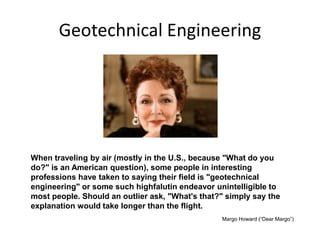7 Easy Facts About Geotheta Described
7 Easy Facts About Geotheta Described
Blog Article
Excitement About Geotheta
Table of ContentsSome Ideas on Geotheta You Need To KnowSome Known Questions About Geotheta.The smart Trick of Geotheta That Nobody is Talking AboutGeotheta for DummiesGeotheta for Dummies

They carry out website investigations, collect examples, execute lab tests, and assess information to assess the viability of the ground for building tasks - Geotechnical Engineers. Based on their findings, geotechnical engineers offer referrals for structure layout, incline security, maintaining frameworks, and reduction of geotechnical threats. They team up with various other professionals, such as architects, architectural engineers, and construction teams, to make certain that geotechnical factors to consider are incorporated right into the total task style and execution
By assessing the habits and homes of soil and rock, they can recognize prospective geotechnical risks such as landslides, soil negotiation, or slope instability. Their know-how assists protect against failures or accidents that might jeopardize lives and residential or commercial property. Below are some thorough obligations and obligations of a geotechnical engineer: Website Examination: Geotechnical designers conduct site examinations to collect data on subsurface conditions.
They interpret the data to comprehend the residential properties and actions of the dirt and rock, including their stamina, permeability, compaction characteristics, and groundwater problems. Geotechnical Evaluation and Style: Geotechnical engineers assess the data accumulated throughout site investigations to evaluate the stability and suitability of the website for construction tasks. They perform geotechnical calculations and modeling to evaluate factors such as bearing capability, negotiation, incline security, lateral planet pressures, and groundwater circulation.
Not known Facts About Geotheta
Structure Layout: Geotechnical designers play a critical function in developing structures that can securely support the designated structure. They analyze the dirt problems and lots requirements to establish the proper foundation kind, such as shallow structures (e.g., grounds), deep structures (e.g (https://www.pageorama.com/?p=geotheta)., stacks), or specialized methods like soil renovation. They take into consideration factors such as negotiation limits, bearing capability, and soil-structure interaction to develop optimal structure styles
They evaluate building and construction strategies, screen website tasks, and carry out area evaluations to verify that the layout referrals are adhered to. If unexpected geotechnical concerns arise, they analyze the scenario and offer suggestions for removal or changes to the style. Risk Evaluation and Mitigation: Geotechnical designers analyze geotechnical dangers and dangers connected with the project website, such as landslides, liquefaction, or dirt erosion.

Collaboration and Communication: Geotechnical designers function closely with various other specialists associated with a task, such as designers, structural designers, and building and construction groups. Effective interaction and partnership are important to incorporate geotechnical considerations into the total job layout and building and construction process. Geotechnical engineers offer technical knowledge, solution queries, and ensure that geotechnical needs are fulfilled.
Geotheta Fundamentals Explained
Here are some kinds of geotechnical engineers: Structure Designer: Structure designers focus on developing and examining foundations for frameworks. They assess the soil conditions, load requirements, and site attributes to establish one of the most proper structure kind and layout, such as shallow foundations, deep foundations, or specialized techniques like pile foundations.
They evaluate the factors influencing incline stability, such as dirt properties, groundwater conditions, and incline geometry, find out here and establish methods to stop incline failings and reduce dangers. Earthquake Engineer: Earthquake designers specialize in assessing and designing frameworks to withstand seismic forces. They evaluate the seismic risk of a site, review dirt liquefaction capacity, and establish seismic style requirements to make sure the safety and security and strength of frameworks throughout quakes.
They do field testing, gather samples, and examine the collected information to identify the soil homes, geologic formations, and groundwater conditions at a website. Geotechnical Instrumentation Designer: Geotechnical instrumentation designers concentrate on tracking and determining the actions of dirt, rock, and frameworks. They install and keep instrumentation systems that monitor variables such as soil settlement, groundwater degrees, slope activities, and architectural displacements to analyze efficiency and provide very early warnings of potential issues.
The 6-Second Trick For Geotheta
They perform examinations such as triaxial tests, consolidation examinations, straight shear tests, and permeability examinations to collect information for geotechnical evaluation and layout. Geosynthetics Engineer: Geosynthetics designers concentrate on the design and application of geosynthetic materials, such as geotextiles, geogrids, and geomembranes. They use these products to boost dirt security, strengthen slopes, provide drainage solutions, and control disintegration.
They tend to be investigative individuals, which implies they're intellectual, introspective, and investigative. They are interested, methodical, reasonable, logical, and rational. Some of them are likewise social, indicating they're kind, charitable, participating, person, caring, handy, understanding, sensible, and pleasant - Geo Tech Engineering.
In the office environment, geotechnical designers utilize specialized software application tools to execute calculations, produce styles, and analyze information. They prepare reports, testimonial job specifications, communicate with clients and employee, and coordinate project activities. The office setup supplies a favorable setting for study, evaluation, and collaboration with other experts associated with the task.
Our Geotheta Diaries
They often go to job sites to carry out website investigations, analyze geotechnical conditions, and gather information for evaluation. These brows through involve traveling to various locations, sometimes in remote or challenging surfaces. Geotechnical designers may do soil tasting, conduct examinations, and screen building and construction tasks to make sure that the geotechnical facets of the project are being implemented appropriately.
Geotechnical designers also work in specialized geotechnical laboratories. Geotechnical laboratory designers function extensively in these settings, dealing with screening tools, operating tools, and recording data.
Report this page